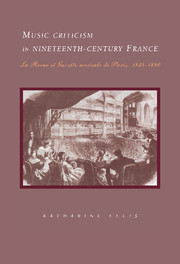Book contents
- Frontmatter
- Contents
- Acknowledgements
- List of abbreviations
- Introduction
- 1 Crosscurrents in early nineteenth-century criticism
- 2 The rise of the specialist press from 1827
- 3 Early music
- 4 The Austro-German tradition I: The reception of Gluck, Haydn and Mozart
- 5 The Austro-German tradition II: The reception of Beethoven
- 6 The Austro-German tradition III: Weber, Schubert and Mendelssohn
- 7 Contemporary music I: Piano music
- 8 Contemporary music II: Chamber and symphonic music
- 9 Contemporary music III: Opera
- 10 Contemporary music IV: The music of the future
- 11 Contemporary music V: Berlioz
- Conclusion
- Appendix 1 Principal contributors to the Gazette
- Appendix 2 Personalia
- Appendix 3 Contes, nouvelles, dialogues and other short literature in Schlesinger's Gazette musicale, 1834–46
- Appendix 4 Publishing history of the Gazette
- Appendix 5 Pseudonyms and attributions
- Bibliography
- Index of musical works cited
- General index
1 - Crosscurrents in early nineteenth-century criticism
Published online by Cambridge University Press: 22 September 2009
- Frontmatter
- Contents
- Acknowledgements
- List of abbreviations
- Introduction
- 1 Crosscurrents in early nineteenth-century criticism
- 2 The rise of the specialist press from 1827
- 3 Early music
- 4 The Austro-German tradition I: The reception of Gluck, Haydn and Mozart
- 5 The Austro-German tradition II: The reception of Beethoven
- 6 The Austro-German tradition III: Weber, Schubert and Mendelssohn
- 7 Contemporary music I: Piano music
- 8 Contemporary music II: Chamber and symphonic music
- 9 Contemporary music III: Opera
- 10 Contemporary music IV: The music of the future
- 11 Contemporary music V: Berlioz
- Conclusion
- Appendix 1 Principal contributors to the Gazette
- Appendix 2 Personalia
- Appendix 3 Contes, nouvelles, dialogues and other short literature in Schlesinger's Gazette musicale, 1834–46
- Appendix 4 Publishing history of the Gazette
- Appendix 5 Pseudonyms and attributions
- Bibliography
- Index of musical works cited
- General index
Summary
The first three decades of the nineteenth century saw music criticism change from a discipline dominated by literary critics to one presided over by trained musicians addressing their readers in technical language; in the fourth decade, Romanticism's penchant for a fusion of the arts brought writers back into the music critic's domain, producing some of the most imaginative and original criticism of the entire century. This book's first two chapters focus on newspapers and periodicals in which important critical traditions (of both message and medium) were established and modified. They do not offer a comprehensive survey of critical opinion up to 1834; rather, they address philosophical and practical issues in early music criticism, provide a set of reference points by which to assess the Gazette's importance, and illuminate the reception of particular composers and schools of composition. Chapter 1 concentrates on four sources of criticism: Julien-Louis Geoffroy's column in the Journal des débats, 1800–14, the Correspondance des amateurs musiciens, 1802–5, the Tablettes de Polymnie, 1810–11, and Castil-Blaze's criticism for the Journal des débats, 1820–32.
Julien-Louis Geoffroy
It is one of the paradoxes of the history of music criticism in France that the discipline should have gained its first major impetus through the work of a literary critic who ‘insisted on talking about music for his entire career, despite understanding hardly a single note of it’.
- Type
- Chapter
- Information
- Music Criticism in Nineteenth-Century FranceLa Revue et gazette musicale de Paris 1834–80, pp. 8 - 32Publisher: Cambridge University PressPrint publication year: 1995



